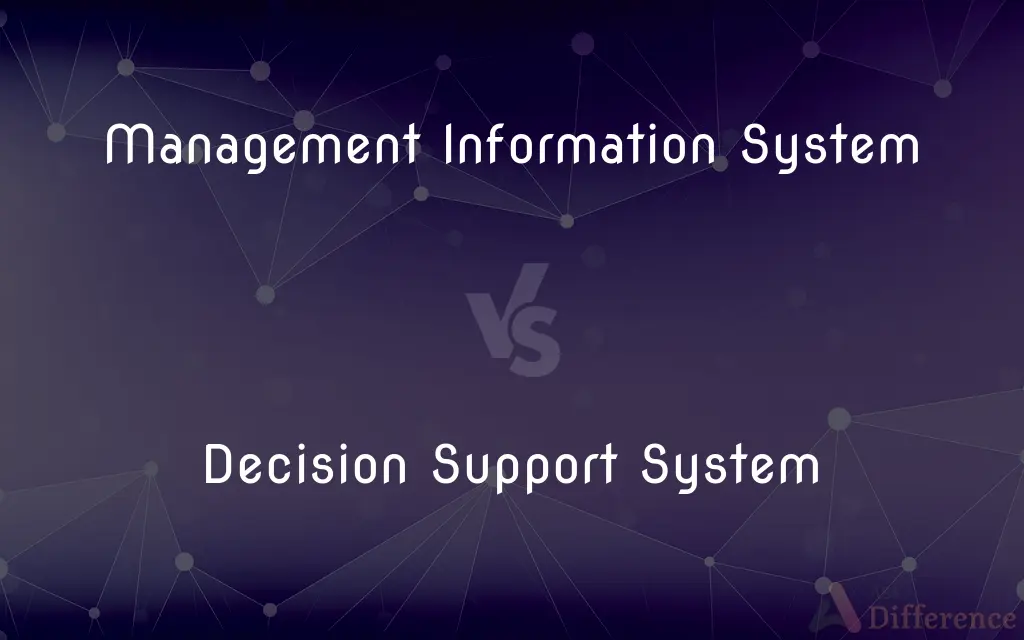Management Information System vs. Decision Support System — What's the Difference?
By Tayyaba Rehman — Published on December 17, 2023
Management Information System (MIS) is a system providing routine information for management. Decision Support System (DSS) is a system assisting decision-making with analytical tools.

Difference Between Management Information System and Decision Support System
Table of Contents
ADVERTISEMENT
Key Differences
MIS is designed to compile and process data to provide management with information necessary for decision-making. It focuses on the collection, processing, storage, and dissemination of information.
DSS, on the other hand, is more focused on analysis and decision support. It uses data, models, and analytical tools to help managers solve complex problems.
While MIS emphasizes on providing reports and summaries, DSS leans towards providing in-depth analysis, predictions, and simulations.
DSS often involves more user interaction for the analysis of data, while MIS typically automates the reporting process.
MIS is usually used for routine decisions and operations, while DSS is designed for more complex decision-making processes.
ADVERTISEMENT
The primary goal of DSS is to support and improve the decision-making process, whereas MIS is geared towards managing regular information flow.
Comparison Chart
Focus
Routine data processing and reporting
Analytical processing and decision-making support
Usage
Regular operations and decisions
Complex, non-routine decision-making
Interaction
Less interactive, automated reports
Highly interactive, user-driven analysis
Output
Summaries, reports
Predictions, simulations, analytical results
Goal
Efficient information management
Enhanced decision-making support
Compare with Definitions
Management Information System
MIS organizes and manages data for effective decision-making.
The company's MIS streamlined data access for all departments.
Decision Support System
DSS employs models for predictions.
The DSS predicted customer behavior accurately.
Management Information System
MIS supports decision-making with timely information.
The MIS played a key role in their strategic planning.
Decision Support System
DSS facilitates complex decision processes.
For the merger, the DSS provided invaluable insights.
Management Information System
MIS processes business information to aid management.
Their MIS transformed raw data into meaningful insights.
Decision Support System
DSS helps in analyzing data for complex decisions.
The DSS was crucial in analyzing market trends.
Management Information System
MIS provides operational reports for management.
The weekly sales report from the MIS helped in resource allocation.
Decision Support System
DSS is a tool for solving complex business problems.
They used the DSS to find solutions to logistical challenges.
Management Information System
MIS acts as a repository for business data.
The MIS housed all historical sales data for analysis.
Decision Support System
DSS provides interactive support for decision-making.
Managers used the DSS for real-time scenario analysis.
Common Curiosities
Who typically uses MIS?
MIS is used by managers for operational decisions and reporting.
What is a Management Information System?
It's a system that processes and manages data for routine decision-making and reporting.
What does a Decision Support System do?
It assists in complex decision-making by providing analytical tools and simulations.
Can DSS predict future trends?
Yes, DSS can use predictive models to forecast trends.
Is DSS useful for routine decisions?
DSS is more suited for complex, non-routine decisions.
Can MIS help in strategic planning?
Yes, MIS can provide the necessary data for strategic planning.
What kind of problems can DSS solve?
DSS can solve complex and unstructured problems.
Is MIS limited to data within an organization?
Mostly, yes. MIS usually handles internal data.
Can DSS use external data sources?
Yes, DSS can integrate and analyze both internal and external data.
Is training required to use MIS or DSS?
Basic training might be required, but it largely depends on the system's complexity.
Does MIS involve a lot of user interaction?
MIS typically involves less user interaction and more automated reporting.
Can MIS generate ad-hoc reports?
Typically, MIS generates routine reports, but some systems might allow ad-hoc reporting.
Does MIS require specialized knowledge to use?
Generally, no. MIS is designed for straightforward use by managers.
Is DSS easy to use for non-technical staff?
DSS might require some level of technical understanding for complex analysis.
Does DSS work in real-time?
Some DSS can provide real-time analysis and decision support.
Share Your Discovery

Previous Comparison
Shear Stress vs. Tensile Stress
Next Comparison
Branched Polymer vs. Linear PolymerAuthor Spotlight
Written by
Tayyaba RehmanTayyaba Rehman is a distinguished writer, currently serving as a primary contributor to askdifference.com. As a researcher in semantics and etymology, Tayyaba's passion for the complexity of languages and their distinctions has found a perfect home on the platform. Tayyaba delves into the intricacies of language, distinguishing between commonly confused words and phrases, thereby providing clarity for readers worldwide.











































